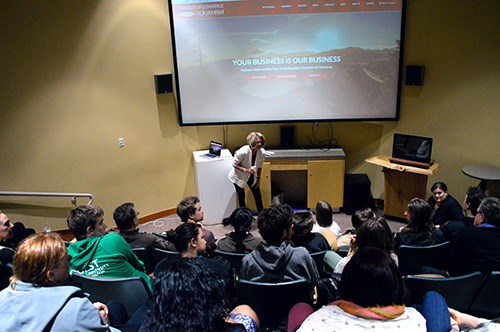At a time when B.C. protests have been gathering national attention, it’s clear the Kinder Morgan pipeline has also become top of mind for some in Squamish.
During MP Pamela Goldsmith-Jones’ latest visit to town, the pipeline was the first topic brought up during a question-and-answer session at the Squamish Adventure Centre on April 13.
The timing of the discussion was fitting — the prime minister has said he expects to meet with the premiers of Alberta and B.C. over the weekend in order to strike a deal over the project.
Mayor Patricia Heintzman, who was in the audience at the forum, asked the MP why the federal government hadn’t considered an initiative that would get Albertans to refine the oil within their province before funneling it through the pipeline.
It’s been reported that one of Premier John Horgan’s main concerns about the pipeline is that it would be transporting diluted, unrefined bitumen.
One of Horgan’s worries is that in the event of a spill, the chemicals used to dilute oil for transit may have unforeseen environmental consequences.
However, Heintzman wondered if refining the oil in Alberta — therefore eliminating the need for a diluent — before putting it in the pipeline would help address the issue.
“If the industry could make a business case for refining the oil, they’d be doing it,” replied Goldsmith-Jones. “What industry said — because they do in other places, obviously — [is] they would be losing money every day.”
“Government doesn’t decide that — industry is the investment, and industry decides where it puts its money,” she said. “I think everybody can concur on how that might be better, but without investment from industry, it’s not going to happen — and they’re choosing not to do that.”
Goldsmith-Jones also said that diluent is already being used for oil that’s currently being transported through pipelines
During that discussion, she also said it was “unconstitutional” for either Alberta or B.C. to “deny either province.”
Goldsmith-Jones noted that the federal government is in support of the pipeline, and there's a chance the prime minister and the natural resources minister “will start to turn to powers that they have, that have not been used.”
She later clarified that she was not referring to blocking provincial transfer payments, a measure that many fear may be used to quell pipeline opposition in B.C.
However, while it took a lot of the time, pipeline talk wasn’t the sole topic raised during Goldsmith-Jones’ visit.
Her intention during the visit was to answer questions about the federal budget, which was presented in February.
One audience member queried her about the Liberals’ promise to not run deficits over $10 billion — something which hasn’t happened this budget.
“I, too, challenge [Finance Minister Bill Morneau] on the fact that he is not intending to return to non-deficit spending until 2025,” said Goldsmith-Jones.
The federal government is projecting this year’s spending to create between $15.1 billion to $18.1 billion of deficit.
As of the end March 2017, the federal debt stood at $631.9 billion.
With respect to small businesses, Goldsmith-Jones noted proposed measures against income sprinkling have been softened. Income sprinkling refers to the practice of business owners dividing their earnings among family members in order to their lower tax rates.
Other measures that were seen as being too hard on businesses have also been blunted, as the result of feedback from small businesses like those in Squamish, she said.
Here in town, many small business owners were quick to criticize those proposed measures, saying it would impose an unfair financial burden.
Goldsmith-Jones also stated that the federal government was committed to housing and regional transit. However, municipalities and the province would also have to come together, as they hold much sway over how those policies would be implemented, she said.
The MP also drew attention to the federal government’s efforts to increase equality between men and women.
Businesses with women at the helm will get better access to government procurement contracts, she said.
“We’d like to see 15 per cent — just 15 per cent — of government procurement contracts go to women who lead businesses,” she said.
A special fund was also created for women in technology, she added.
There was also some concern expressed about the influx of people arriving in Canada from the United States who identified as refugees.
Goldsmith-Jones replied those who don’t meet authorities’ definition of refugee are being turned back.
Federal officials have even been going to the U.S. to tell people that Canada will not blindly accept anyone at the border, Goldsmith-Jones said.
“There isn’t any way to skip the line,” she said.



